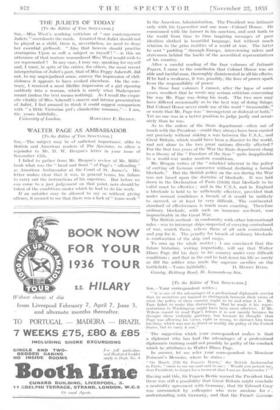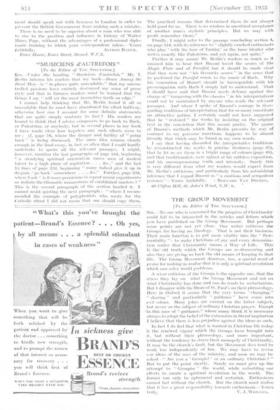[To the Editor of TIM SPECTATOR.]
SIR)—Your correspondent writes : . " It is one of the advantages of a•professional.diplomatic service that its members are trained to distinguish between their views of what the policy of their country ought to be and what it is, Mr. Page failed to make this distinction. Had he made it his repre- sentations to Washington might have been more effective, If Mr. Wilson ceased to read-Page'S rettorS it not merely because he thought them violently partisan, but because he thought that Page was allowing his views, right or wrong, to distract him from his duty, which was not to direct or modify the policy of the United Stiles, hut to carry it out."
• • • , •
The. suggestion which your correspondent makes is that a diplomat who has had -the advantages of a professional diplomatic 'training 'could-not possibly be guilty of the -conduct which he attributes to Walter Hines Page.
In answer, let me refer your: correspondent to Monsieur Poincare's Memoirs, where he states : " On March 271-hr Francis Dertie," the British Ambassador in Paris, came ti) see me and said to me : WoUld you permit me, dear President, to forgot for a moment that I am an Ambassador ? ' " Having said t Ills, Sir Francis Bertie warned the Pr6ideat that there was still a possibility that Great Britain might conclude a neutrality agreement with Germany, that Sir Edward Grey was surrounded by colleagues who were anxious for e understanding with Germany, and that the French CA overtv
ment should speak out with firmness in London in order to prevent the British Government from making such-a mistake.
There is no need to be superior about a man who was able to rise to the position and influence in hiStOry of Walter Hines Page, without the advantages of a professional diplo- matic training. to Which your correspondent refers.—Yours































































































 Previous page
Previous page